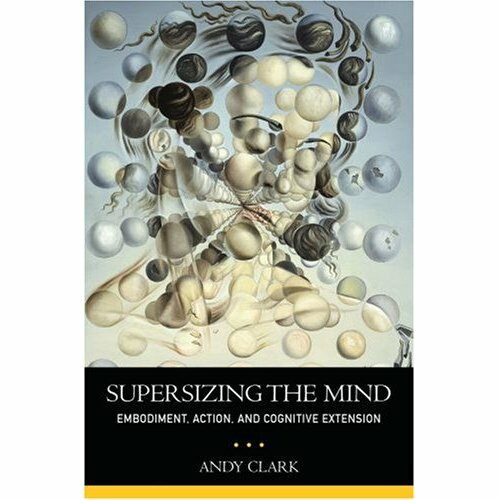
Good article from Eric Schwitzgebel, the person behind The Splintered Mind. I am a fan of Andy Clark's writing, and if you aren't familiar with him, you can check out a huge number of his papers, compared to other authors, at his publications page.
In thinking about introspection, Eric went back to Clark's Supersizing the Mind: Embodiment, Action, and Cognitive Extension, a book I own (after having read some of his essays online) but have not yet read. Apparently, he hadn't read it yet, either, so I don't feel so slow.
Here is some of the beginning of the post:
Clark is one the the leading advocates of the view that cognitive processes extend beyond the boundaries of the brain to include aspects of the body and environment. The boundary of skull and skin is no privileged border, such that human cognition can only take place within it. If mental images of Scrabble letters are part of your cognitive process when thinking about your next play, then so also are the actual physical tiles when you manipulate and use them in an analogous way. When you work to create an environment that helps you remember, your knowledge is partly distributed into that environment. The mind is not just in the skull; it is "supersized".Eric concludes with a statement that I agree with completely, especially after my recent immersion into constructivism and cultural psychology, both of which advocate a kind of extended mind similar to that about which Clark writes:
I've been struggling lately to develop a general account of what introspection is. I characterize my view as "pluralist" -- I think a variety of mechanisms drive what are rightly thought of as introspective judgments. It now suddenly dawns on me that what I'm really doing is "supersizing" introspection. Introspective processes -- what are sometimes thought of as the most "inward" things there are -- often include the body and world, and broader aspects of the mind than is generally supposed.
How do I know what emotion I'm in? Do I turn on the inner emotion-scanner mechanism, which then produces the judgment that I'm (say) envious? How do I know my preferences? My imagery? My sensory experience? Philosophical opinion basically divides into two camps: First (probably the mainstream) are those who advocate "detection-after" accounts, according to which I have the experience (or other mental process in question) and once that completes (and maybe also while it continues) a separate scanning process of some sort detects the presence or absence of that state.
I think that introspection, like much of cognition according to Clark, is multi-faceted, partly in short connections in the head, partly in broad interactions in the head, and partly spread out into the body and environment.Yep.
Tags:
No comments:
Post a Comment